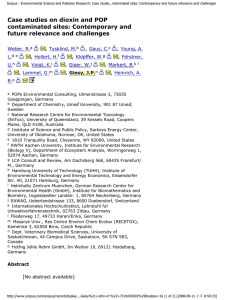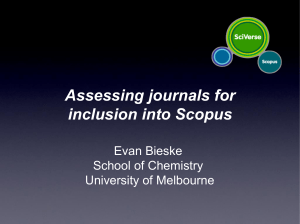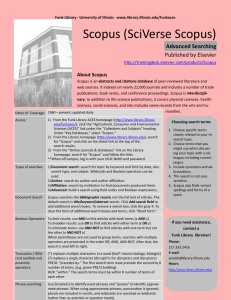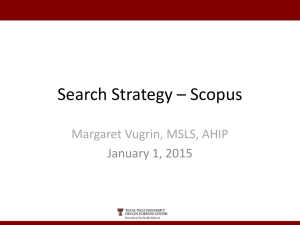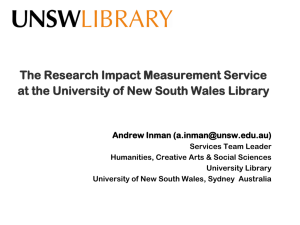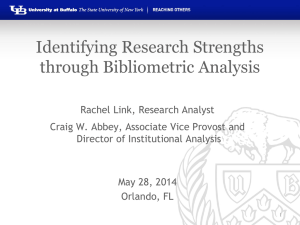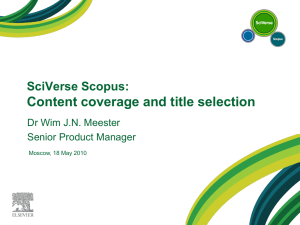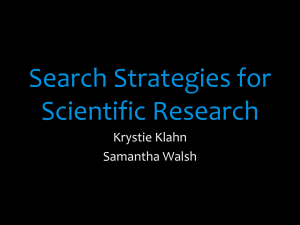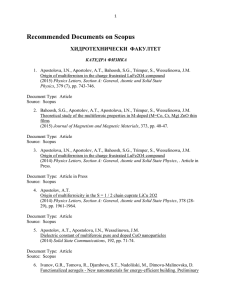Scopus (SciVerse Scopus) Basic Searching Published by Elsevier About Scopus
advertisement
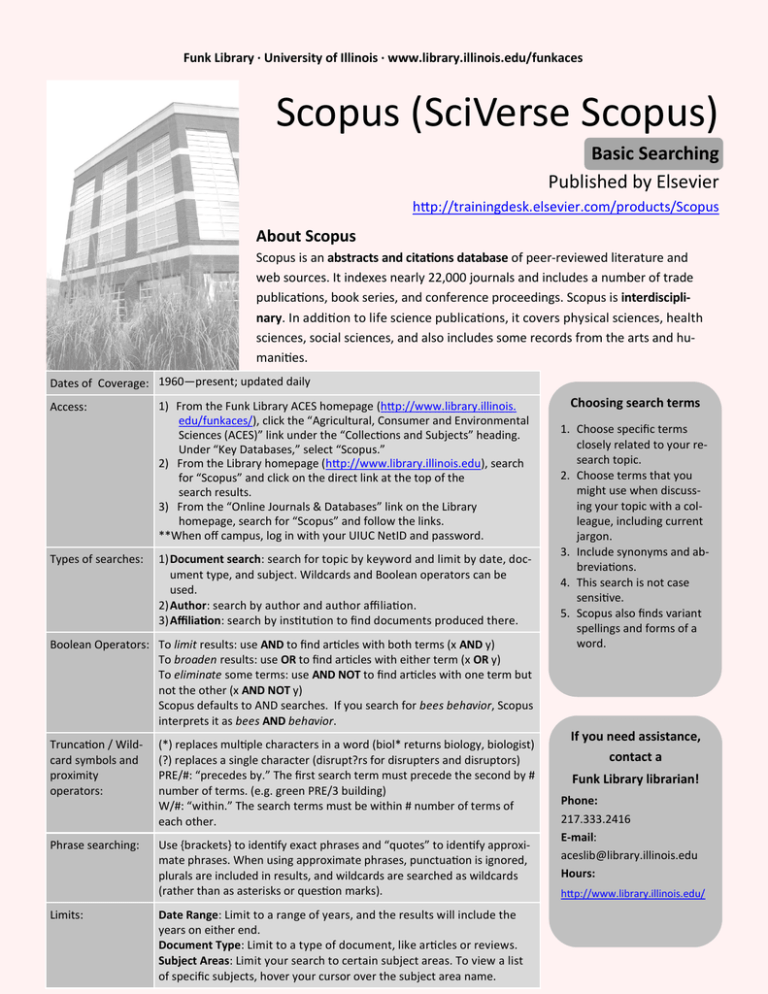
Funk Library · University of Illinois · www.library.illinois.edu/funkaces
Scopus (SciVerse Scopus)
Basic Searching
Published by Elsevier
http://trainingdesk.elsevier.com/products/Scopus
About Scopus
Scopus is an abstracts and citations database of peer-reviewed literature and
web sources. It indexes nearly 22,000 journals and includes a number of trade
publications, book series, and conference proceedings. Scopus is interdisciplinary. In addition to life science publications, it covers physical sciences, health
sciences, social sciences, and also includes some records from the arts and humanities.
Dates of Coverage: 1960—present; updated daily
Access:
Types of searches:
1) From the Funk Library ACES homepage (http://www.library.illinois.
edu/funkaces/), click the “Agricultural, Consumer and Environmental
Sciences (ACES)” link under the “Collections and Subjects” heading.
Under “Key Databases,” select “Scopus.”
2) From the Library homepage (http://www.library.illinois.edu), search
for “Scopus” and click on the direct link at the top of the
search results.
3) From the “Online Journals & Databases” link on the Library
homepage, search for “Scopus” and follow the links.
**When off campus, log in with your UIUC NetID and password.
1) Document search: search for topic by keyword and limit by date, document type, and subject. Wildcards and Boolean operators can be
used.
2) Author: search by author and author affiliation.
3) Affiliation: search by institution to find documents produced there.
Boolean Operators: To limit results: use AND to find articles with both terms (x AND y)
To broaden results: use OR to find articles with either term (x OR y)
To eliminate some terms: use AND NOT to find articles with one term but
not the other (x AND NOT y)
Scopus defaults to AND searches. If you search for bees behavior, Scopus
interprets it as bees AND behavior.
Truncation / Wildcard symbols and
proximity
operators:
(*) replaces multiple characters in a word (biol* returns biology, biologist)
(?) replaces a single character (disrupt?rs for disrupters and disruptors)
PRE/#: “precedes by.” The first search term must precede the second by #
number of terms. (e.g. green PRE/3 building)
W/#: “within.” The search terms must be within # number of terms of
each other.
Phrase searching:
Use {brackets} to identify exact phrases and “quotes” to identify approximate phrases. When using approximate phrases, punctuation is ignored,
plurals are included in results, and wildcards are searched as wildcards
(rather than as asterisks or question marks).
Limits:
Date Range: Limit to a range of years, and the results will include the
years on either end.
Document Type: Limit to a type of document, like articles or reviews.
Subject Areas: Limit your search to certain subject areas. To view a list
of specific subjects, hover your cursor over the subject area name.
Choosing search terms
1. Choose specific terms
closely related to your research topic.
2. Choose terms that you
might use when discussing your topic with a colleague, including current
jargon.
3. Include synonyms and abbreviations.
4. This search is not case
sensitive.
5. Scopus also finds variant
spellings and forms of a
word.
If you need assistance,
contact a
Funk Library librarian!
Phone:
217.333.2416
E-mail:
aceslib@library.illinois.edu
Hours:
http://www.library.illinois.edu/
Funk/ACES Library · University of Illinois · www.library.illinois.edu/funkaces
Document Search Overview
Scopus searches the bibliographic record, not the full text of articles. The default search is article title/keyword/abstract search.
Click Add search field to add additional search boxes. You can select different fields to search for each new search box. To remove a search box, click the gray X beside it. To clear the form of all additional search boxes and terms, click “Reset form.”
Title/
Abstract/
Keyword:
Searches the title, abstract, and keywords in the article record. Keywords include author-provided keywords,
matched terms (such as chemical names, trademark names, and manufacturers) and index keywords from
EMTREE, MeSH, and Compendex. Use the drop-down menu to search the title, abstract, or keywords individually.
Authors:
Search for an author using the format “last name, initials” (e.g. blaschek, h). When searching for an author with a
common name, sometimes it is easier to use the specialized Author search function, which groups together the
various versions of an author’s name under one record and identifies their affiliation.
Source Title: Search for the name of a journal, conference proceeding, trade publication, or book series. Useful when added to
other searches; for example, start with an author search for “blaschek” and add a search field, limited to source
title, for “applied biochemistry and biotechnology,” to find all articles published by Blaschek in Applied Biochemistry and Biotechnology.
Results:
1. Results are automatically sorted by Date Published. Change the sorting via the options on the right side above
the results, e.g. to Relevance or Cited by (number of times article was cited). Additional options are available by
clicking the green “…” button.
2. Limit your search to specific years or subjects with the “Refine” tool on the left side of the page.
3. To quickly access the abstract, hover your cursor over the title of a result article, then click the link “Show Abstract.”
4. Use the checkboxes to select interesting articles, and use the options located at the top of the list to download
selected PDFs, export citations, e-mail, and more.
5. Use the blue “Discover full text” button to locate full text of articles not available for download through Scopus.
Search history:
View search history by clicking “Search” in the green navigation bar at the top of the page. Search history is
located below the search box. Use search history to combine queries, save searches, and set alerts. For
more on alerts and saved searches, as well as other personalization features, the Scopus: Advanced Search
handout.
Find full text, save,
export citation, etc.
To find full text:
Scopus provides two ways to access full-text articles. 1) Click the blue Discover full text linking button. If the
article is available to UIUC users, a link to the article appears in the “Full Text” section. If not, you will be
provided links to search for the journal in the library catalog or request a photocopy of the article through
InterLibrary Loan (ILL). The Discover button also allows you to download the citation to Refworks. 2) Scopus’s download manager. If the journal is published by Elsevier, the full text is available. At the top of the
search results page (with article selected) or in the article record, click “Download.”
To export citations:
One at a time: On the search results page, click on the checkbox beside the document title and click
“Export” at the top of the page. In the document record, click “export” at the top of the page, under the
“Quick Search” box. Select the desired format from the drop-down box (the default is citation only) and
type of output. Click “Export.” If exporting to Refworks, a login page will open in a new window or tab.
You can also click the blue Discover full-text linking button in a document record. Under “Reference,”
choose an export method.
Batch: On the search results page, use the checkboxes to select a group of documents. Above the results
list on the search results page, click the “Export” link. Select the desired format and type of output. Using
the options above the search results, you can also e-mail or print citations, and create a bibliography.
For more ‘Help’ contact Funk Library at 217-333-2416, OR just Ask A Librarian !
This guide is available online at: http://www.library.illinois.edu/funkaces/handouts/Scopus_basic.pdf
Created 3/7/2012 by cmr; Last updated 6/6/2014 by kmv; rev. 8/26/2014
